Man Gets Warned to Stop Giving Human Food to His Friend's Cat, Repeats It, and Gets His Whole Meal Trashed
Certain cats will come to you begging and pleading for food, especially if they see you eating. It's risky and shouldn't be encouraged to give your cat any table scraps or small amounts of human food for several reasons.
First and foremost, cats require the nutrients that are explicitly included in high-quality cat diets. Any "extras" they consume will make them less hungry for their regular meals.
While a tiny piece of chicken or turkey from your dinner plate won't harm a cat, you are unintentionally fostering negative behavior in it. Certain human foods are acceptable for our beloved cats as occasional treats.
However, since their wet and dry food is designed to satisfy all of their nutritional needs, cats technically don't need human food at all. They should also avoid many foods meant for humans.
All forms of garlic, whether raw or cooked, as well as garlic powder and salt, are harmful to cats. No, cats shouldn't even consider eating garlic, so make sure your cat never comes into contact with it, as it is about five times more harmful to cats than onions are.
The OP of today's story had warned her husband's friend numerous times to stop giving their cat human food. This friend once tried feeding the cat garlic bread, and the OP trashed his whole meal, which upset him.
The OP writes
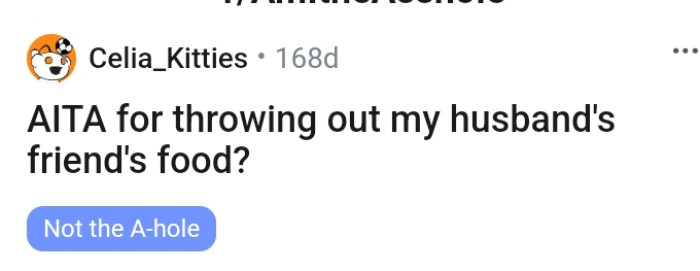
OP grabs it away and yells at him to get the hell away from her cat until he's learned some manners

The Reddit post received more than 2k comments, and we've gathered some of the most upvoted ones for you below
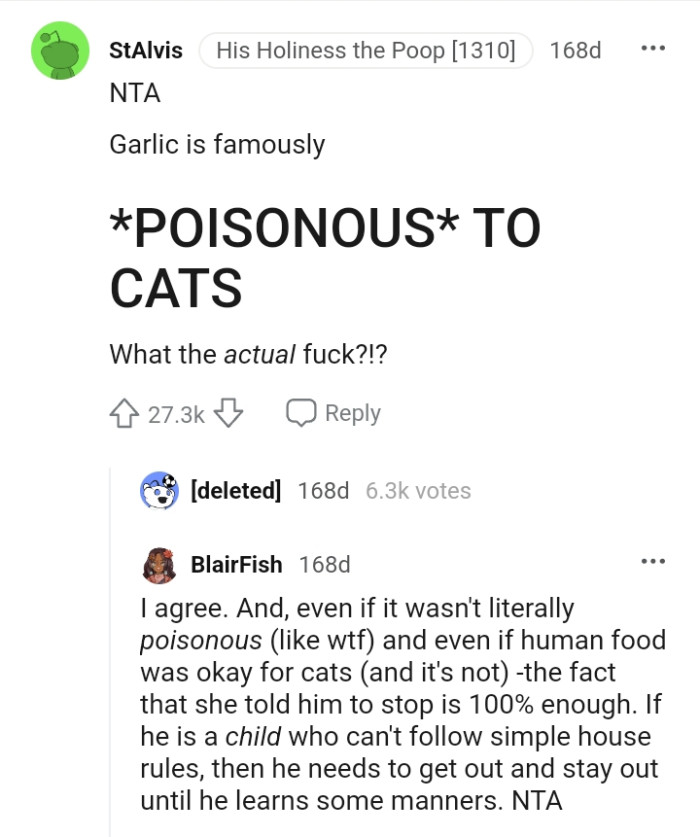
Understanding Animal Care Responsibilities
Pet ownership comes with significant responsibilities that can sometimes clash with personal beliefs about animal care. Dr. James Wilson, a veterinarian and animal behaviorist, explains that providing proper nutrition for pets is crucial for their health and well-being. The friend's reaction to the human food being given to the cat highlights a common conflict between pet owners and non-pet owners regarding appropriate care practices.
This situation underscores the importance of establishing clear guidelines for pet care among friends to avoid misunderstandings.
Understanding Pet Ownership and Human Behavior
Dr. Michael Chen, an animal behaviorist, explains that pet ownership often reflects deeper emotional needs and desires for companionship.
Research shows that pets can provide emotional support, but they also require careful consideration of their needs and boundaries.
This highlights the importance of understanding the responsibilities that come with pet ownership and the impact of human behavior on animals.
It's interesting that OP's husband keeps inviting him over
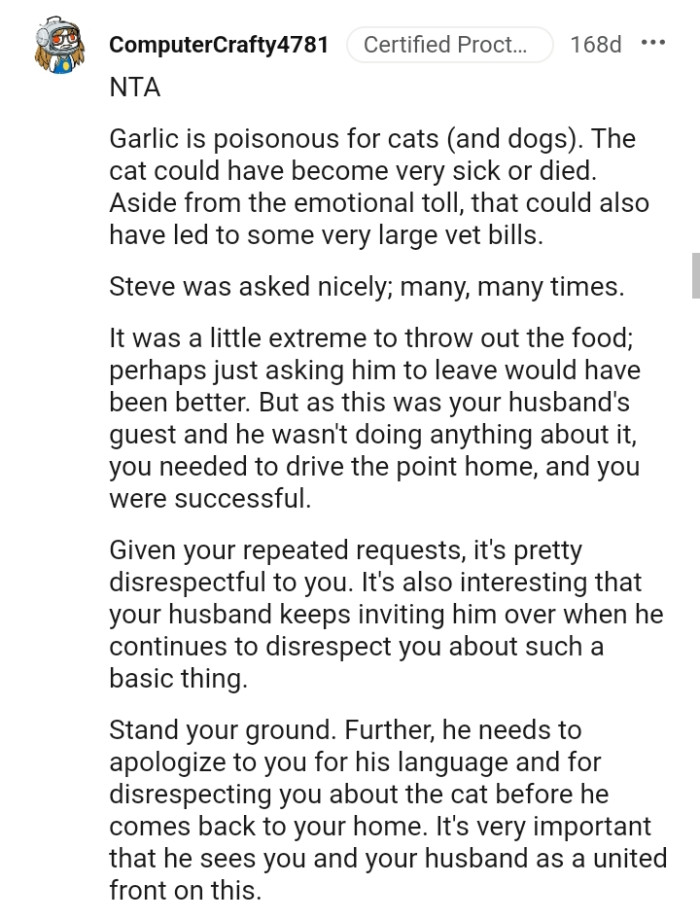
It does highlight a significant issue
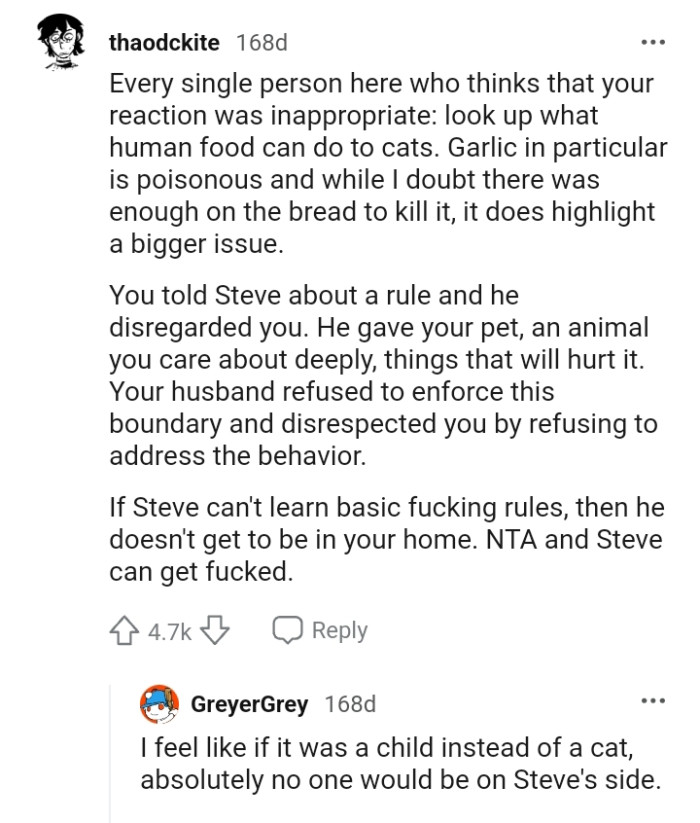
The OP didn't have the right to trash his meal
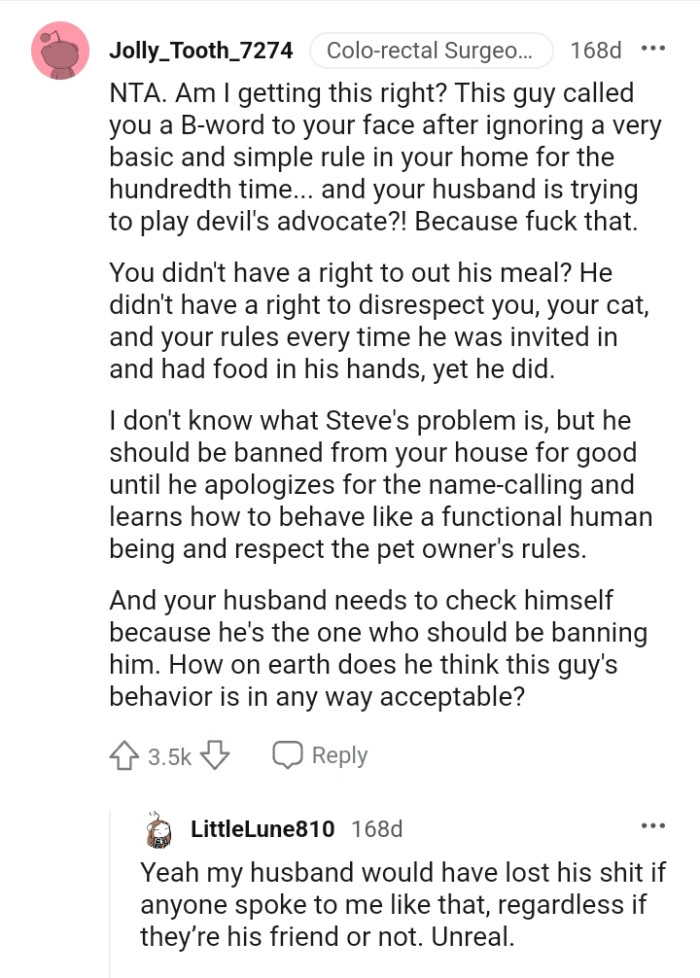
Moreover, research in animal behavior indicates that feeding pets human food can lead to health issues, which can create tension if one pet owner is not following the established guidelines. A study published in the Journal of Animal Behavior found that improper dietary practices can lead to significant health complications in pets, emphasizing the importance of adhering to veterinarians' recommendations.
Experts in animal psychology note that feeding pets human food can lead to health issues and behavioral problems.
In this case, the friend's reaction may stem from a protective instinct for their pet's well-being, emphasizing the importance of adhering to proper pet care guidelines.
Recognizing these boundaries can help prevent conflicts and promote healthier interactions between pet owners.
From a Redditor who believes the OP has more of a husband problem
NTA, though you have more of a husband problem than a husband's friend problem. Steve has shown he has zero respect for you in your own home with your own pet, and your husband is allowing this to continue in your home.
He can maintain his friendship with Steve, but he should not be welcome in your shared home where he only respects one resident and keeps trying to feed the family pet food that could make them ill or even be toxic to them.
Why is his behavior even tolerated in the first place?
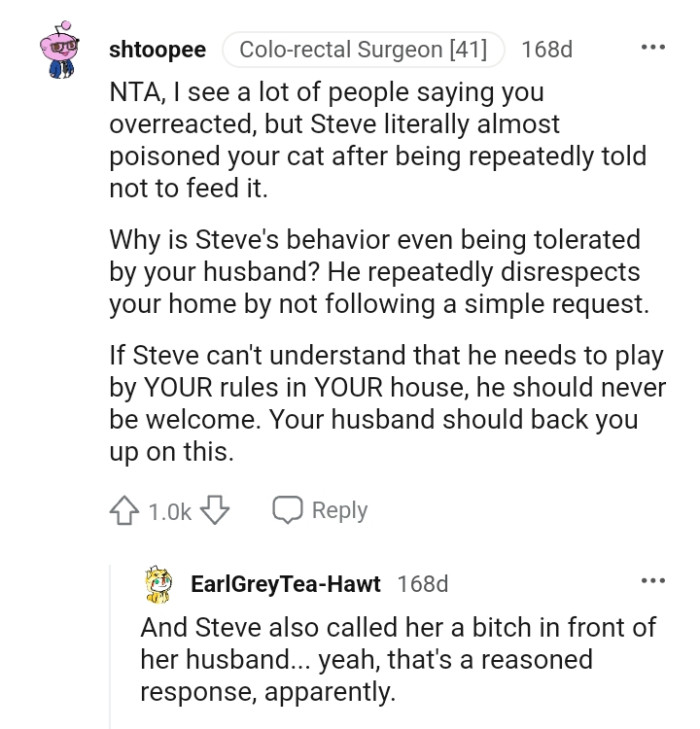
The husband did nothing when his wife was called names

Garlic is toxic to cats

The Role of Communication in Pet Ownership
Effective communication is essential for navigating conflicts related to pet care. Research suggests that clearly outlining pet care expectations can help maintain harmony among pet owners and friends. Setting boundaries and discussing pet care philosophies can prevent misunderstandings and build a cooperative approach to animal care. Engaging in open discussions about pets can foster a sense of community and shared responsibility, as noted by Dr. Esther Perel, a renowned couples therapist, who states, "Communication is the foundation of any relationship, including those we have with our pets and their caregivers." Her insights emphasize the importance of dialogue in nurturing relationships, which can be applied to pet care dynamics.
The Ethics of Pet Care and Human Responsibility
According to studies published in the Journal of Applied Animal Welfare Science, responsible pet ownership requires understanding the specific needs of animals.
This situation illustrates the ethical considerations that come with pet ownership, particularly regarding diet and care.
Research shows that adhering to proper feeding guidelines can enhance the well-being of pets and strengthen the human-animal bond.
The OP should give Steve cat food
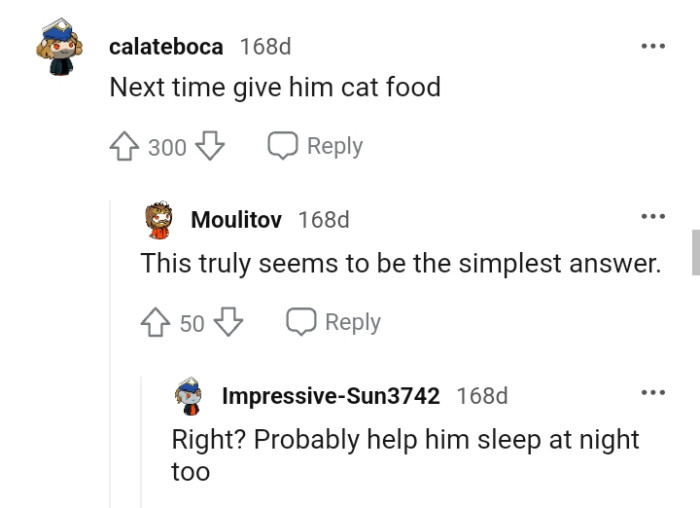
OP's husband is as much of an AH as his friend
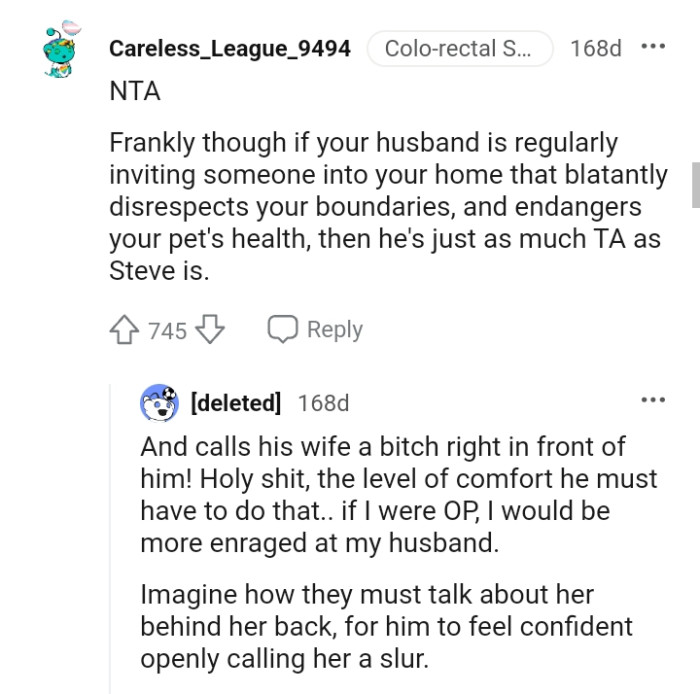
Neither of them would be allowed back

This situation also raises questions about the nature of friendship and respect for boundaries. According to Dr. Laura H. Smith, a clinical psychologist, when individuals feel their boundaries are being crossed, it can lead to feelings of frustration and resentment. Understanding and respecting each other's perspectives on pet care can mitigate these feelings and foster healthier relationships.
Behavioral scientists emphasize that pet ownership often involves navigating the expectations and boundaries set by pet owners.
In this case, the friend's insistence on following strict dietary guidelines reflects a broader concern for pet health and well-being.
Understanding these dynamics can help individuals navigate pet ownership more effectively and foster positive interactions.
It essentially communicates one's belief when they are so significant that they think they can harm or even cause inconvenience to other living beings on a whim. In addition to being poisonous to dogs and cats, this friend has been warned to cut it out.
Many Redditors say that if the OP's husband continues to let his friend do this despite her repeated requests for him to stop, then she has a problem with her marriage.
Strategies for Responsible Pet Ownership
Experts recommend establishing clear guidelines for pet care and discussing expectations with friends and family.
Engaging in regular conversations about pet health and well-being can promote understanding and prevent conflicts.
Research supports that responsible pet ownership involves respecting the boundaries set by pet owners, which enhances the overall health and happiness of animals.
Psychological Analysis
This situation highlights the complexities of pet ownership, particularly regarding dietary choices and the responsibilities that come with caring for animals.
Recognizing and respecting these boundaries can promote healthier interactions and understanding among pet owners.
Analysis generated by AI
Analysis & Alternative Approaches
Pet ownership involves significant responsibilities that impact both animals and their human companions.
By fostering understanding and respect for pet care guidelines, individuals can navigate conflicts more effectively and enhance the human-animal bond.
Ultimately, acknowledging the ethical considerations of pet ownership is vital for promoting responsible care and healthy interactions.
Best Practices for Pet Care Among Friends
Establishing best practices for pet care can significantly improve relationships among pet owners. Research indicates that discussing and agreeing on pet care standards can enhance mutual respect and understanding. The individual in this scenario might consider initiating a conversation with their friend about pet care expectations to foster cooperation and build trust.
Creating a pet care plan that aligns with both parties' values can strengthen the friendship while ensuring the pet's well-being.
Psychological Analysis
This situation illustrates the common conflicts that arise over differing beliefs about pet ownership and care. The friend's strong reaction may stem from a desire to protect the cat's well-being and a misunderstanding of the other person's intentions, highlighting the need for clearer communication about pet care responsibilities.
Analysis generated by AI
Analysis & Alternative Approaches
In conclusion, navigating the complexities of pet ownership requires effective communication and mutual respect among friends. Research consistently highlights the importance of discussing expectations and responsibilities to maintain healthy relationships. By fostering open dialogue about pet care, individuals can create a supportive environment that benefits both pets and owners alike.



